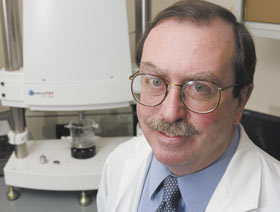  |
| HOME | THIS ISSUE | CALENDAR | GRANTS | BACK ISSUES | < BACK | NEXT > |
Health Center researcher studies stress, fatigue in dental materialsby Pat Keefe - December 12, 2005 |
||||
|
For Dr. J. Robert Kelly, failure is success. Kelly, a professor of oral rehabilitation, biomaterials, and skeletal development, specializes in dental materials – pushing them to their breaking point, then examining their clinical failure in order to improve them. He develops tests that mimic the stresses that materials – such as ceramics for fillings, alloys for implants, or adhesives – undergo in the mouth. He observes and records the effects when the materials stress, fatigue, and break, and uses those observations to build stronger, improved materials. He holds six patents for his work, including four that are licensed to industry. “It’s a combination of engineering and dentistry,” Kelly says. “We’ve had a number of important outcomes in terms of how materials perform structurally, and that’s led to the creation of a network of international colleagues who share a common goal: we want to improve the materials dentists have for treating patients.” Dental research at the Health Center got a boost when the 2003 National Institutes of Health renewal of the General Clinical Research Center included funds for a “dental core.” Kelly helped formalize the proposal. In addition to administering the dental research clinic, the dental core now provides assistance in research budgeting and guidance on protocol development and regulatory issues. Kelly says the dental core also provides guidance on study coordination, which is especially helpful to faculty members new to clinical research. Implant technology is one of the factors pushing dental innovation. Kelly and his colleagues are establishing an implant fatigue research center to explore the issues associated with implantation. Academic expertise runs in his family. His father was a college dean and his mother was also involved in higher education. He’s always been interested in materials – his master’s degree from Marquette and doctoral degree from the joint program at MIT/Harvard are related to materials science.
Before joining the Health Center faculty five years ago, Kelly completed a 21-year naval career, where he rose to command the Naval Dental Research Institute. He also spent nearly a dozen years as a guest scientist at the National Institute of Standards and Technology in Gaithersburg, Md. “I tend to be more oriented towards the translation side of the research equation,” he says. “I’ve been involved with a lot of industry-sponsored work enhancing existing materials, and I’ve partnered with industry in creating some well-validated tests. I like the variety of the things I’m currently involved in – the challenge of the research, the quality of the students, residents, and fellows, the integration of the dental and medical faculty. It’s exciting and stimulating.” Graduate education figures heavily in his research initiatives. He is research mentor to three junior faculty members and three residents. He has been major thesis advisor for residents from four different specialty areas in the dental school, and he will be course director teaching biomaterials to graduate dental students. Kelly’s work at the standards bureau, his investigative acumen, and his international collaborations on materials research prompted his recruitment as one of the officers representing the United States in developing international standards on behalf of the American Dental Association and the American National Standards Institute. He was also asked to be a convener of the working group at the International Organization for Standardization, writing and maintaining the international standards for dental ceramics. He says one revised standard is close to being published. |
| ADVANCE HOME UCONN HOME |

